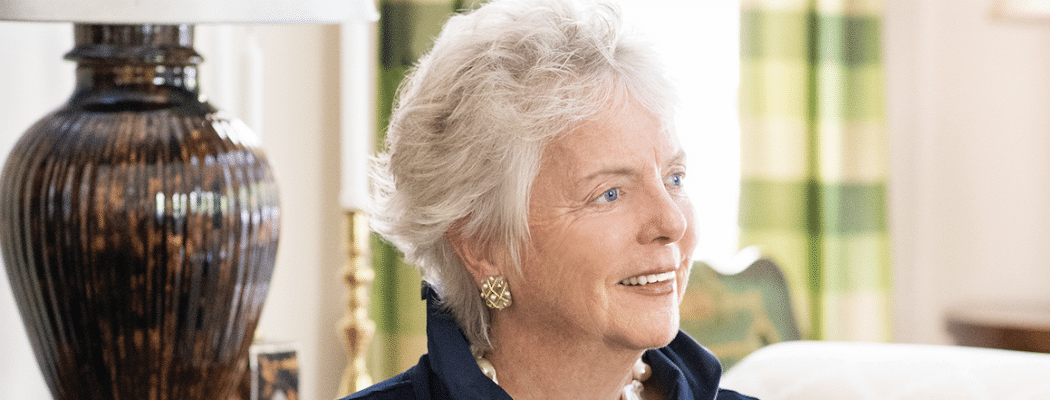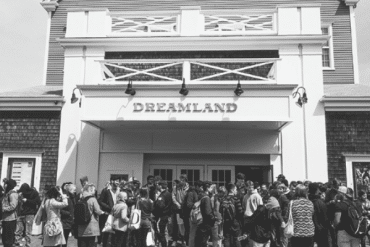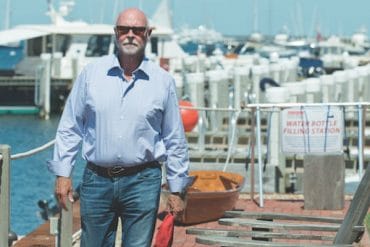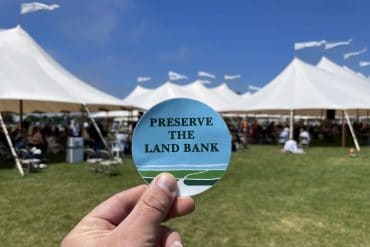Nantucket summer resident Christy Lee Brown brings health and wellness full circle.
 Christina Lee Brown exudes the refined elegance that one might associate with an old American family. Her late husband, Owsley Brown, was the scion of the Brown-Forman Corporation, a company which, thanks to its bourbon distilleries, has been a backbone of Louisville, Kentucky, for generations. But any presumption that Brown might be detached from the realities of the world is very quickly dispelled. A woman of deep faith, Brown is acutely aware of the economic and social inequality facing the country and has dedicated herself to a variety of philanthropic enterprises designed not only to support her beloved Louisville but also to raise consciousness around the profound impact of the environment on our well-being. Radiating charm and eternal optimism, Brown has used her platform to respond to the current social unrest seen in Kentucky and epitomizes the meaning of social responsibility. N Magazine sat down with Christy Brown to gain insights as to what drives her and what solutions she sees for today’s social unrest.
Christina Lee Brown exudes the refined elegance that one might associate with an old American family. Her late husband, Owsley Brown, was the scion of the Brown-Forman Corporation, a company which, thanks to its bourbon distilleries, has been a backbone of Louisville, Kentucky, for generations. But any presumption that Brown might be detached from the realities of the world is very quickly dispelled. A woman of deep faith, Brown is acutely aware of the economic and social inequality facing the country and has dedicated herself to a variety of philanthropic enterprises designed not only to support her beloved Louisville but also to raise consciousness around the profound impact of the environment on our well-being. Radiating charm and eternal optimism, Brown has used her platform to respond to the current social unrest seen in Kentucky and epitomizes the meaning of social responsibility. N Magazine sat down with Christy Brown to gain insights as to what drives her and what solutions she sees for today’s social unrest.
N MAGAZINE: You’re originally from Maryland and have lived most of your life in Kentucky. How did you discover Nantucket?
BROWN: We have been here since the early eighties and relatives brought me here. My father had recently died, and my brother and I wanted a summer place that my mother might enjoy going to, a place where the grandchildren could visit her. We bought this little property, this tiny little postage stamp, and had a little shack on this little spit of land. We fixed that up a little bit and then Mummy started coming, and the children and grandchildren started coming and visiting and they all love it.
N MAGAZINE: Your late husband Owsley helped expand the international reach of whiskeys like Jack Daniel’s and Southern Comfort while serving as president of his family company, Brown-Forman. Are you a bourbon drinker?
BROWN: When Owsley and I were first married, in 1968, we moved right away from Washington to Louisville. I really didn’t drink bourbon. My grandmother and parents in Maryland had loved bourbon forever, but I was a gin drinker. So, I decided I had to figure out a way that I could really enjoy bourbon. At that time, my husband’s family company Brown-Forman partnered with bartenders who made one of these mixes called Pussycat. I discovered that mix and all of a sudden, I loved bourbon.
 N MAGAZINE: Do you have any involvement with the company today?
N MAGAZINE: Do you have any involvement with the company today?
BROWN: No, I’m a very proud shareholder. I was a very proud wife to Owsley who worked hard to grow the international arm of the company. I was his partner in any way that was appropriate. I was proud that our three children are all proud shareholders and engaged in various ways.
N MAGAZINE: You and Owsley also played an enormous role in revitalizing Louisville. When most people think of philanthropy, they think of people writing checks, but your form of philanthropy is very different. Could you explain your philosophy?
BROWN: Our foundation is not that old. We started it in the seventies. Because of that, every dollar that we contributed to a cause was very precious and we wanted to do the best we could to be helpful in other ways to the cause. If you really care, you need to do it all. So, we did it all. We licked stamps, we campaigned. If you really care, you get into it, you get your hands dirty. To me, that is the way philanthropy really is at its best.
N MAGAZINE: Louisville has been at the center of national protests. Damage was undoubtedly done to buildings and projects that you and your late husband were responsible for creating. How have you processed all of this?
BROWN: We had the tragic killing of Breonna Taylor in Louisville and it has been the cause of great pain. It’s still an extraordinarily difficult time in Louisville, but it has given me time to reflect. Clearly, even though I and others like me think we’ve been trying, we clearly have not been trying in the right ways. We clearly have not been listening adequately. We clearly have not been caring in all of the right ways. So, I started on a listening mission with my Black leader friends and what I’ve found is that we—the political leadership, the current political leadership and frankly the past leadership—haven’t realized adequately the interconnectedness of all of us. We have not adequately understood that there are no simple answers.
 N MAGAZINE: If you could distill one answer that you have taken away from these conversations with Black leadership in Louisville, what would it be?
N MAGAZINE: If you could distill one answer that you have taken away from these conversations with Black leadership in Louisville, what would it be?
BROWN: Listen, listen, listen. Create new kinds of ways to converse about the realities of people’s lives. Start neighborhood by neighborhood. In listening, I’ve found a group of Black leaders who developed a platform called Path Forward in Louisville. I have now become an advocate for sharing that document with our corporate, political and philanthropic community. I hand-delivered a copy of it to the mayor’s home with a letter encouraging him to surround himself by the Black leaders of our community to converse about how to make Path Forward our next two-year blueprint for the city.
N MAGAZINE: Could you explain your work with the Circle of Harmony and Health?
BROWN: I believe the work of all not-for-profits is basically for health. The Circle of Harmony and Health is a tool to help guide and empower individuals and communities to live the healthiest, most-balanced life possible, and to understand the interconnection between all forms of health. It is made up of eight parts with each heart representing an aspect of health: nutritional, economic, environmental, psychological, intellectual, spiritual, cultural and physical. The hearts are directly connected to the others, which together make up an individual’s and a community’s holistic health. At the heart of the circle, you’ll find healthy air, water and soil. Access to those three basic elements is the critical foundation to our communal health. The systems supporting any community—government, philanthropy, corporations—must consider the health of the entire system in order to make healthy decisions.
N MAGAZINE: Where is this work taking place?
BROWN: We’ve been able to bring this thinking into the University of Louisville, where we are now housed with our Envirome Institute in the medical school. We will begin to use the word “health” in all of its forms, because we need to have a new vision of health in order to really survive. I am very proud that we have brought this concept of dealing with the whole human ecosystem.
 N MAGAZINE: Who has been one of your mentors in developing this approach to health?
N MAGAZINE: Who has been one of your mentors in developing this approach to health?
BROWN: Prince Charles has probably been my greatest mentor and professor. He has written this extraordinary book called Harmony that taught me about this interconnectedness in all forms of health and how imperative it is that we understand the interconnectedness. I consider Prince Charles to be a really lovely friend. He was kind enough to come to Louisville five years ago to visit with us and help reinforce the importance of understanding this interconnectedness. If you all of a sudden begin to think of yourself as nature, it’s a whole different way that you deal with the plants in the garden or the soil or the food that you eat.
N MAGAZINE: How do we start to repair the division in our country?
BROWN: I’m very anxious to figure out our commonalities. This is why our Circle of Harmony and Health is so important— because I think the language needs to be changed. If we could agree that what we all care about is health in all of its forms, then decisions can made through that lens. They’re not political decisions; they’re health decisions. That’s how we’re going to find our common ground again.






